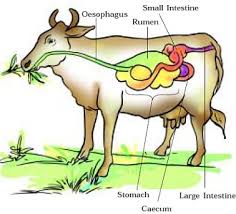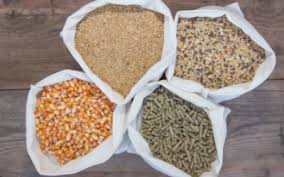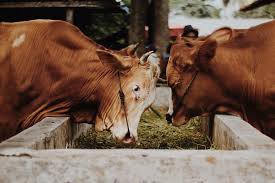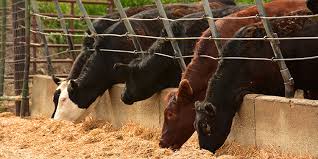Feeding and nutrition of ruminant animals play a crucial role in ensuring their health, productivity, and overall well-being. Ruminants, which include cattle, sheep, goats, and deer, have a unique digestive system that allows them to break down fibrous plant materials effectively.
This process begins in the rumen, where microbial fermentation occurs, enabling ruminants to extract essential nutrients from tough plant matter such as grass and hay. Understanding the dietary needs of these animals is vital for farmers and animal husbandry practitioners who aim to optimize growth, reproduction, and milk production.
The digestive system of ruminants consists of four compartments: the rumen, reticulum, omasum, and abomasum. Each part plays a specific role in the digestion process. The rumen acts as a fermentation vat, housing billions of microbes that help break down cellulose and hemicellulose found in plant cell walls.
The reticulum works alongside the rumen to filter and collect small food particles for further fermentation or regurgitation as cud. The omasum absorbs water and nutrients, while the abomasum, similar to the human stomach, produces digestive enzymes to break down proteins and other nutrients. This intricate system allows ruminants to convert low-quality forage into high-quality protein, which is essential for their growth and productivity.
The nutritional requirements of ruminants can be categorized into several key components: energy, protein, minerals, vitamins, and water. Energy is primarily derived from carbohydrates, which are abundant in forage and grains. Ruminants require a balanced diet that provides sufficient energy for maintenance, growth, reproduction, and lactation.
Protein is essential for tissue development and repair, as well as for milk production in lactating females. High-quality protein sources include legumes, oilseed meals, and certain grains. Additionally, ruminants need a proper balance of minerals such as calcium, phosphorus, and magnesium to support bone health, reproduction, and metabolic functions.
Vitamins also play a significant role in the nutrition of ruminants. Vitamins A, D, and E are particularly important for maintaining health and supporting immune function. While ruminants can synthesize some vitamins from their diet, they may still require supplementation to ensure optimal health, especially when grazing on low-quality forages or during certain life stages, such as pregnancy or lactation.
Water is often an overlooked but critical nutrient for ruminants. They require access to clean and fresh water at all times, as dehydration can lead to serious health issues and decreased productivity.
Feeding strategies for ruminants must consider their unique digestive system and nutritional needs. Proper management of forage quality, quantity, and availability is essential for maximizing their nutritional intake.
Farmers often use pasture rotation, supplementation with grains or concentrates, and the introduction of high-quality forages to enhance the diet of their ruminants. Furthermore, understanding the life stages and production goals of the animals can help in formulating the most effective feeding programs.
The Digestive System of Ruminants

The digestive system of ruminants is specialized to break down complex carbohydrates found in plants. Key components of the ruminant digestive system include:
1. Rumen: The largest compartment, where fermentation occurs. Microbes break down fibrous materials, producing volatile fatty acids, which provide energy.
2. Reticulum: This chamber works closely with the rumen, helping to trap foreign objects and aid in the fermentation process.
3. Omasum: This compartment absorbs water and nutrients from the feed. It has many folds, increasing the surface area for absorption.
4. Abomasum: Known as the “true stomach,” the abomasum secretes gastric juices to digest proteins. It functions similarly to the stomach of non-ruminants.
5. Esophagus: Ruminants can regurgitate food to re-chew it, a process known as rumination, which aids in further digestion.
Key Nutritional Requirements for Ruminants
Ruminants require a balanced diet to maintain health and productivity. Key nutritional requirements include:
1. Energy: Ruminants need energy for maintenance, growth, and production. Energy is primarily derived from carbohydrates and fats in their diet.
2. Protein: Essential for growth, reproduction, and milk production. Ruminants require both degradable intake protein (DIP) and undegradable intake protein (UIP) for optimal performance.
3. Vitamins: Vitamins A, D, and E are crucial for various bodily functions, including immunity and reproduction.
4. Minerals: Essential minerals like calcium, phosphorus, and magnesium are vital for bone health, metabolic functions, and milk production.
5. Water: Fresh and clean water is critical for digestion, nutrient absorption, and overall health.
Read Also: Trichomoniasis: Description, Damages Caused, Control and Preventive Measures
Types of Feeds for Ruminant Animals

Ruminants can consume a variety of feeds. The main types include:
1. Forages: These are the primary feed for ruminants and include grasses, legumes, and silage. Forages provide fiber essential for proper rumen function.
2. Concentrates: High-energy feeds such as grains (corn, barley) are used to supplement forages, especially during periods of high production.
3. By-Products: Agricultural by-products, such as soybean meal and distiller’s grains, provide additional protein and energy.
4. Supplements: Minerals and vitamin supplements are often added to the diet to ensure ruminants meet their nutritional needs.
5. Total Mixed Ration (TMR): A complete feed mixture containing forages, concentrates, and supplements. TMR ensures a balanced diet and can improve feed efficiency.
Importance of Fiber in Ruminant Diets
Fiber is a crucial component of ruminant diets, serving several important functions:
1. Rumen Functionality: Fiber stimulates rumen contractions, promoting healthy digestion and fermentation.
2. Microbial Health: Adequate fiber supports the growth of beneficial microbes in the rumen, which aid in breaking down complex carbohydrates and producing volatile fatty acids for energy.
3. Preventing Digestive Disorders: A diet rich in fiber helps prevent conditions like acidosis and bloat, which can occur if ruminants consume too many concentrates.
4. Satiety and Weight Management: Fiber-rich feeds help ruminants feel full, supporting healthy body condition and preventing overfeeding.
Role of Protein in Ruminant Nutrition
Protein is essential for various physiological processes in ruminants:
1. Growth and Development: Protein supports muscle growth, tissue repair, and overall development in young ruminants.
2. Milk Production: Lactating ruminants require higher protein levels to produce quality milk, as protein is a key component of milk.
3. Reproduction: Adequate protein intake is vital for reproductive health, supporting the development of embryos and the maintenance of pregnancies.
4. Immune Function: Protein plays a critical role in the immune system, helping ruminants fight infections and maintain overall health.
Vitamins and Minerals Essential for Ruminants
Vitamins and minerals are crucial for ruminant health, supporting various bodily functions:
1. Vitamin A: Essential for vision, immune function, and reproduction. A deficiency can lead to night blindness and reproductive issues.
2. Vitamin D: Important for calcium and phosphorus metabolism, which is vital for bone health.
3. Vitamin E: Acts as an antioxidant, protecting cells from damage and supporting reproductive health.
4. Calcium: Necessary for bone formation, muscle function, and milk production. A deficiency can lead to milk fever in lactating animals.
5. Phosphorus: Essential for energy metabolism and bone health. It is often found in forages and grains.
Nutritional Needs at Different Life Stages
Ruminants have varying nutritional requirements based on their life stages:
1. Young Ruminants: Calves and lambs require high-quality protein and energy to support rapid growth. Starter feeds often include higher protein levels.
2. Growing Ruminants: As they grow, their protein and energy needs will stabilize. Forages and grains should be balanced to ensure steady growth.
3. Pregnant Ruminants: Pregnant animals require additional energy and protein to support fetal development. Increased mineral intake is also essential.
4. Lactating Ruminants: Lactating females have the highest nutritional needs, requiring ample energy, protein, vitamins, and minerals to support milk production.
5. Mature Ruminants: Nutritional needs decrease after growth and lactation, but they still require a balanced diet to maintain health and condition.
Read Also: Aspergillosis: Description, Damages Caused, Control and Preventive Measures
Feeding Strategies for Optimal Health and Production

Implementing effective feeding strategies is crucial for maintaining the health and productivity of ruminants. Here are key strategies to consider:
1. Balanced Diet: Ensure that the diet contains an appropriate balance of forages, grains, proteins, vitamins, and minerals to meet the nutritional needs of ruminants at different life stages.
2. Quality Forages: Use high-quality forages as the primary source of fiber. Legume forages, such as clover and alfalfa, are rich in protein and nutrients.
3. Gradual Diet Changes: Introduce new feeds gradually to allow the rumen to adapt and minimize digestive disturbances.
4. Regular Feeding Schedule: Maintain a consistent feeding schedule to support healthy rumen function and digestion.
5. Supplementation: Consider nutritional supplements, such as minerals and vitamins, especially during critical life stages like lactation and pregnancy, to address specific needs.
6. Water Availability: Ensure constant access to clean water, as hydration is essential for digestion and overall health.
Common Nutritional Deficiencies in Ruminants
Ruminants may experience nutritional deficiencies that can negatively impact their health and productivity. Here are some common deficiencies:
1. Protein Deficiency: Insufficient protein can lead to stunted growth, decreased milk production, and reproductive issues.
2. Mineral Deficiencies:
i. Calcium Deficiency: Can cause milk fever in lactating cows, leading to muscle weakness and possible death.
ii. Phosphorus Deficiency: Affects energy metabolism and can result in poor growth and reproduction.
3. Vitamin Deficiencies:
i. Vitamin A Deficiency: Can lead to poor vision and increased susceptibility to infections.
ii. Vitamin D Deficiency: Impairs calcium and phosphorus metabolism, leading to bone health issues.
4. Energy Deficiency: Inadequate energy can hinder weight gain, milk production, and overall health.
The Impact of Nutrition on Ruminant Performance
Proper nutrition is vital for optimal ruminant performance. Here’s how nutrition impacts various aspects of ruminant health and productivity:
1. Growth Rates: Well-nourished ruminants experience faster growth rates and achieve market weight more quickly, benefiting producers.
2. Milk Production: Lactating ruminants with balanced diets produce more milk with better quality, which is essential for profitability.
3. Reproductive Efficiency: Adequate nutrition supports reproductive health, leading to higher conception rates and healthier offspring.
4. Disease Resistance: Nutritionally balanced ruminants have stronger immune systems, making them less susceptible to diseases and infections.
5. Feed Efficiency: Properly nourished ruminants convert feed into energy more efficiently, resulting in lower feed costs and improved profitability.
Do you have any questions, suggestions, or contributions? If so, please feel free to use the comment box below to share your thoughts. We also encourage you to kindly share this information with others who might benefit from it. Since we can’t reach everyone at once, we truly appreciate your help in spreading the word. Thank you so much for your support and for sharing!
Read Also: Complete Composting Guide for Beginners






